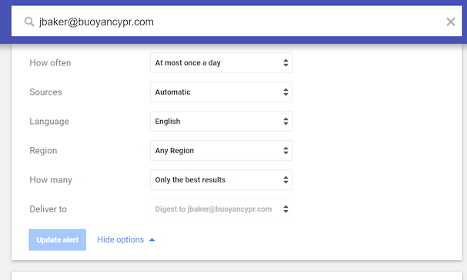
February 2021 What I Heard About You From Google
You are remembering to use Google Alerts, right?
Google Alerts have been around for a long time. They are a free, helpful way to know when you or your book is mentioned online on websites and in the news.
As I plan these weekly notes to my Buoyancy community, my goal is to share nuggets of things I think are valuable for authors to know, whether that’s bits and pieces of news from the industry, or practical tips. Recently I’ve been talking to some authors who weren’t aware of Google Alerts.
You can set up hundreds of them for keywords that are important to you, and also edit and tweak them as often as you want.
I’m told there are many newer and more sophisticated tools out there for tracking all kinds of data about you and your book as it appears on the internet. Maybe that’s why I don’t hear people talking about them as often these days. And in my personal experience they don’t find everything, nor are they set up to track all social media platforms. But I often find really interesting things from the results. So if you are an author (or business owner), you need to have Google Alerts set up about yourself and your book.
You do have at least one, right?
In addition, you can also set alerts for topics that interest you, or even to help generate those “ripped from the headlines” fiction plot lines. You might also set them for business competitors, or those comparable authors you like to keep an eye on and learn from.
If you haven’t started yet with Alerts, or haven’t updated yours for a while, check them out. Simply type “Google Alerts” into your browser and Google will quickly send you to the right place. It’s very easy to set them up, though I just learned you now will need some kind of Google account so they can email you the results. I’m already a Gmail user, but if you are not, I believe you will see a button that says “sign in” when you get to the Alerts screen and you’ll need to follow those prompts.
Once you are good to start working with the form, you’ll want to select options, and also specify how often you want to receive results.
And that’s where you also need to apply a bit of thought. If your name is John Smith, or you share the same name as the Prime Minister of England, you will be likely be flooded with non-helpful results. If you believe mentions of you will generally also include your email address, you might find setting the search term for that unique email address as well.
Another thing I find helpful before establishing the Google Alert is to test it. I put the search term, or keyword, into the box at the top labeled “Create an alert about….” and Google will show me what comes up for that keyword under the heading of Alert Preview. This is a good way to discover what issues there might be.
I set up Alerts for my clients and their book titles. Today I discovered a new client has the same name as a former Texas legislator, and a current doctor in Austin, Texas. That tells me I need to consider a tweak in that Google Alert.
Similarly, while I do have an Alert set for Buoyancy PR, I find it shows me a lot of scientific references to buoyancy. And even though I have used quotation marks around “Buoyancy PR” to indicate I want that exact combination of letters and spaces, that still gets me articles about buoyancy properties. So for me my name or email is more useful.
Selecting options might also be helpful. In my Prime Minister example, specifying the region as United States, would have at least only gotten the Prime Minister mentions from U.S.-based sources.
What results have you received and tips do you have? I would love to hear from you to learn more from your experiences as we travel this road together.



No Comments